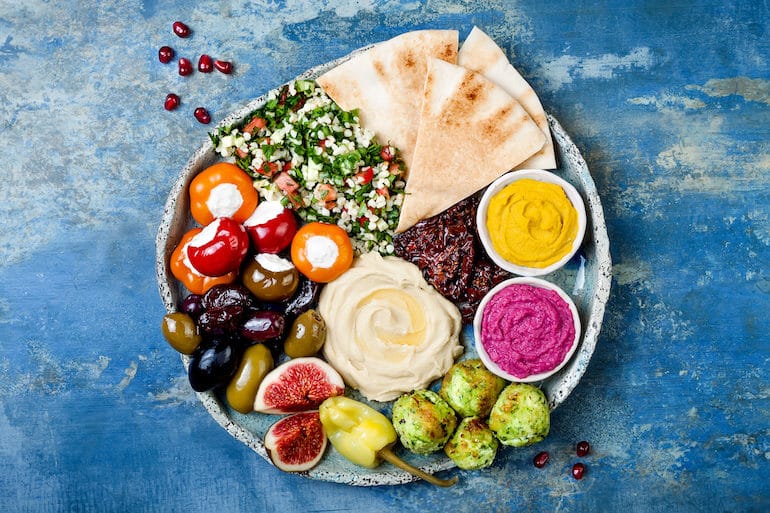THE WELLNEST • Food • Healthy Eating
What Is the Mediterranean Diet Exactly? An RD Advises
By Jessica Bippen, MS, RD •
November 25, 2019
Sure, it’s trending everywhere—but what is the Mediterranean diet exactly? Jessica Bippen, MS, RD, provides answers.
Most diet trends come and go. They’re full of restrictions, put pressure on your social life, and are typically hard to follow for more than a few weeks—and that’s if you even get that far! But what if there were a sustainable diet that focuses on creating a healthy lifestyle with delicious food, and even red wine? Luckily, the Mediterranean diet is exactly that.


What Is the Mediterranean Diet?
Despite being ranked as the best diet to follow in 2019, the Mediterranean diet isn’t new. The trend actually dates back to the 1960s, when researchers found that coronary heart disease caused fewer deaths in countries along the Mediterranean Sea—like Italy and Greece—than in the US and Northern Europe. This discovery sparked extensive research on the diets and lifestyles of those living in Mediterranean regions and their effect on many lifestyle diseases. The Mediterranean diet prizes mostly plant-based foods in their whole form accompanied by moderate amounts of fish, eggs, poultry, and a low intake of red meat and dairy. Accompanied by an active lifestyle, this diet is associated with numerous health benefits, many of which are attributed to the foods being high in fiber, unsaturated fats, antioxidants, and other phytochemicals.Mediterranean Diet Benefits
The most well-known research on the Mediterranean diet regards heart health. In addition to its support for heart health, the diet supports and helps maintain weight loss, and may even protect the brain as it ages. Even further, the Dietary Guidelines for Americans consider the Mediterranean diet as one of the top eating plans to promote overall health and prevent a range of health issues. Over the years, it’s become one of the most followed and recommended ways of eating. It’s not rooted in restriction and doesn’t follow rigid rules. Instead, it’s about creating a sustainable way of eating and living to promote longevity and wellness.Fast Facts
The beauty of the Mediterranean diet is that it’s more of a lifestyle than a fad. Instead of focusing on strict rules, its foundations are built on nutritious foods like vegetables, fruits, beans, whole grains, and healthy fats from nuts and olive oil. Other important elements of the Mediterranean diet are its social aspects, which include sharing meals with friends and family, enjoying a glass of red wine, and staying physically active. While this diet is pretty flexible, there’s a right way to do it. Before you grab a bottle of wine and make a mezze board with olives, fresh fruit, and cheese for every meal, read up on these best practices for following the Mediterranean diet.
How to Follow the Mediterranean Diet
This diet embodies the way of eating and living from numerous countries around the Mediterranean Sea. Since there are many different countries and regional differences, there’s no one way to follow the Mediterranean diet. However, research now shows there are certain similarities among the diets and lifestyle practices across the region. Aside from eating whole, plant-based foods, the Mediterranean diet entails staying away from packaged and processed foods made with added sugar, refined grains, and unhealthy oils.What to Eat on the Mediterranean Diet
- At least 5 servings daily of fruits and vegetables, with vegetables comprising half of your plate
- 1-2 tablespoons of healthy fats per meal
- 3-6 ounces of protein sources like poultry, beans, and eggs per meal
- Daily consumption of whole grains
- Fish at least two times per week
- Moderate portions of dairy products
- Limited intake of red meat
Lifestyle Considerations
- Occasional glass of red wine
- Sharing meals with family and friends
- Staying physically active

Mediterranean Diet Sample Menu
The beauty of this diet is that it’s flexible. The principles are more like guidelines, rather than strict rules. They don’t require strict adherence, and you can adjust them to your individual needs and preferences. Here’s an example of daily Mediterranean diet meals. However, I bet you’ll find it easy to follow it for much longer than that!Breakfast
Plain Greek yogurt with fresh fruit, almond butter, and a drizzle of honeyLunch
Chickpea salad with diced tomatoes, cucumbers, Kalamata olives, and lemon juice, served with a pita and hummusSnack
Handful of mixed nuts like cashews, almonds, or pistachios with a piece of fruit like a pearDinner
Broiled salmon with roasted potatoes, tomatoes, and zucchiniExtra Treats
Wine and dessert can certainly be part of the Mediterranean diet. Enjoy a glass of wine with dinner two nights a week, or drink a glass as part of your dessert with a piece of dark chocolate. It’s a nice way to wind down. Plus, you’ll get a double dose of antioxidants!More like this









